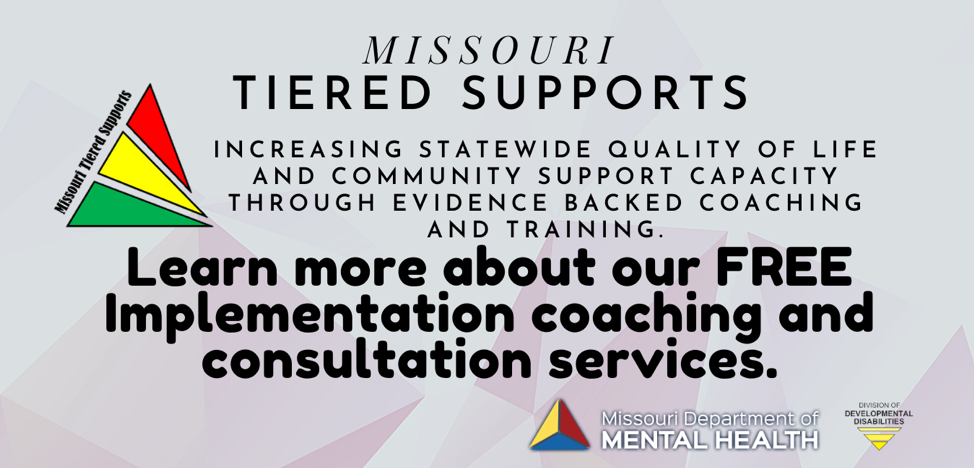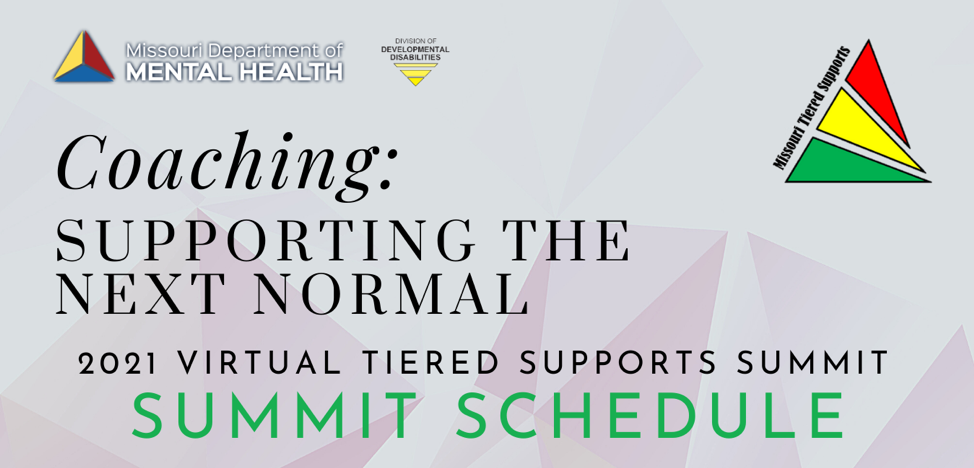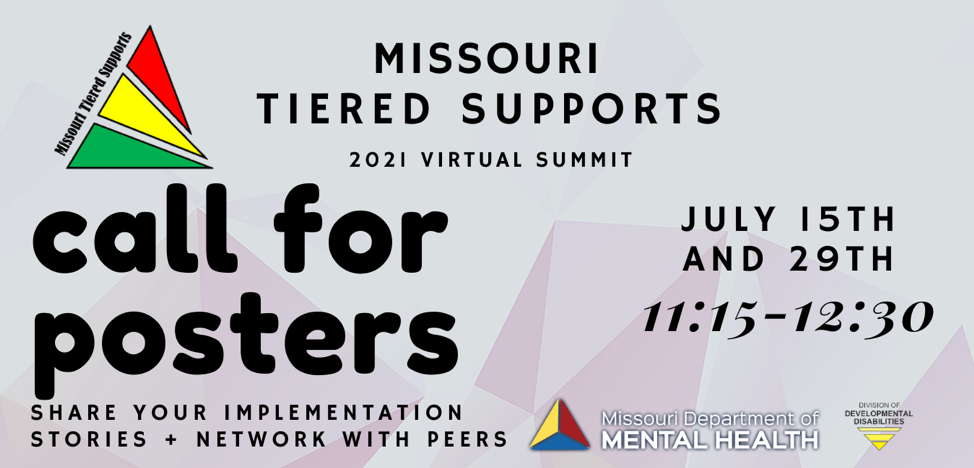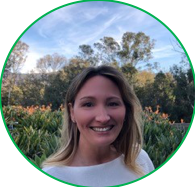
2021 Tiered Supports Summit
The Missouri Tiered Supports Summit will be held virtually each Thursday in July 2021, beginning July 1. The Summit includes live presentations from change agents across the country, small and large group workshops, poster and ignite sessions.
- Meet the Speakers
-
Missouri Tiered Supports invited speakers.
Kimberli Breen - National Behavior Change Agent and Owner of Effective Behavior Change, Inc
Tabari Coleman -Director of Professional Development, Anti-Defamation League
Dr. Dana Paliliunas
Dr. Linda Leblanc
Edward Sanabria
- About Summit
-
Each Thursdays starting in July starting at 9:30am to 12:30pm CST
Invited Speakers- Daily keynotes followed by implementation workshops, poster, or ignite sessions.
Panel Sessions- Learn about Missouri Supports across all Tiers, speakers will share past, current, and upcoming trainings, committees, and mentorship opportunities available.
Poster Sessions- A self-paced exhibit space hosting Tiered Agencies from around Missouri. Each poster includes a video overview of the agency’s implementation story with a link connecting participants to a virtual room hosted by the agency poster team—who will be available to answer questions and make connections.
Interested in submitting a poster of your experiences implementing Multi-Tiered Systems of Support? See below ‘Poster Session’ for more information.
- Week One - July 1, 2021
-
9:30-10:30 Keynote: Dr. Linda LeBlanc
Creating Clinical Systems and Evaluating Clinical Quality
Large human service agencies provide amazing opportunities for organizational analysis and implementation of standard process, procedures, and cultural change interventions. This presentation will describe the process for developing clinical standards and oversight systems for supervision and case peer review. In addition, the presentation will focus on evaluation of the quality of clinical process and the outcomes that are achieved. (CEU Available for this session)
11:15-12:30 Coffee Chats
Network with peers and consultants from across the State based on your common interests, choose a chat or several and join us for coffee and conversation.
- What is Tiered Supports?
- Tier 1 Success Stories
- Provider Support Committee
- Enhancing Transitions
- Tier 2 Success Stories
- Behavior Support Review Committee
- Growing Together
- Tier 3 Success Stories
- Week Two - July 8, 2021
-
9:30-11:00 Keynote: Kimberli Breen
Effectively Partnering with Stakeholders to Create Quality of Life for All
Quality of life matters, for everyone. Thankfully, there are strategies for partnering with others that produce positive results for those who need additional support, and those who support them. Join us to learn how you can leverage skills you already have into improved partnerships with all stakeholders, and improved outcomes for all.
11:15-12:30 Breakout Workshops
Join Positive Supports Consultants from across the state in small group workshops focused on values based recognition and its effect on environments and implementers.
- Week Three - July 15, 2021
-
9:30-10:30 Keynote: Dr. Dana Palilunas
Developing Psychological Flexibility within a Behavioral Framework Using the AIM Curriculum
Psychological flexibility, or persistence with or changing of behavior, in accordance with values-based contingencies, while contacting all stimuli, both public and private, in the present environment, is a central target for therapeutic techniques that emphasize the relationship between human language and psychological suffering (e.g. Bond, Hayes, & Barnes-Holmes, 2006). In the context of Acceptance Commitment Therapy (ACT), interventions are designed to increase this flexibility and support prosocial, adaptive behavior. AIM: A Behavior Analytic Curriculum for Social-Emotional Develop in Children (Dixon & Paliliunas, 2017) provides a framework for supporting individuals’ psychological flexibility using this approach. This session is designed to provide a general introduction to psychological flexibility and the ACT approach, summarize the primary components of the AIM Curriculum and its purpose, and facilitate a discussion regarding individualizing and utilizing this curriculum for a variety of clients in various settings. (CEU's available for this session)
10:30 - 11:10 Agency Recognition with Dr. Mark Stringer and Valerie Huhn introducing new Division of Developmental Disabilities Director, Jessica Bax
11:15-12:30 Poster Session
View prerecorded presentations created by various Tiered Supports agencies across the state. Agency team members will be available during this time for networking and additional information.
- Week Four - July 22, 2021
-
9:30-11:00 Keynote: Tabari Coleman
Exploring our Multiple Identities: Building a Culture of Inclusion
Exploring our Multiple Identities: Building a Culture of Inclusion Everyone is made up of different identities, given, chosen and core and our socialization impacts how we see and understand everything around us, including different identities. These identities impact the way we experience and perpetuate bias and prejudice. Through thoughtful reflection and identity mapping, participants will have a better understanding of themselves, others and the communities they serve
11:15-12:30 Poster Session
View prerecorded presentations created by various Tiered Supports agencies across the state. Agency team members will be available during this time for networking and additional information.
- Week Five - July 29, 2021
-
9:30-10:30 Keynote: Edward Sanabria
Thinking Outside the Box: Rethinking Clinical Repertoires
It has been suggested that in order for the applied field to avoid self-destruction, we must make efforts to avoid being overly rigid, relying on decontextualized or uncritical used manualized protocols, and being perceived as being reductionist or non-responsive (Leaf et al. 2016). A skilled practitioner should look to develop refined repertoires related to compassion and other interpersonal skills, perceptive sensitivity to their environment, constant analysis of their intervention and context, creative and flexible programming, and efficient and inclusive (Taylor, Leblanc, & Nosik, 2019; Leaf et al., 2016; Callahan et al., 2016). These efforts start with the perspective of the clinician, incorporate new research and procedures into practice, and intentionally choose targets that maximize socially significant outcomes. By doing this, we may be able to develop better therapeutic relationships with the families we service, professionals we collaborate with, and the children whose lives we hope to improve while being ambassadors for the field of behavior analysis.
11:30-12:30 Missouri Tiered Supports Team Panel
Learn about Missouri Supports across all Tiers, speakers will share past, current, and upcoming trainings, committees, and mentorship opportunities available.







